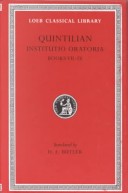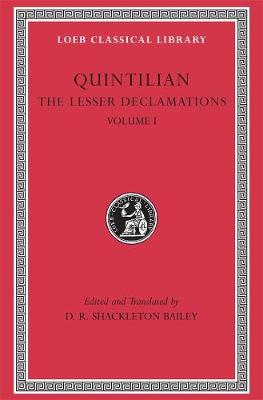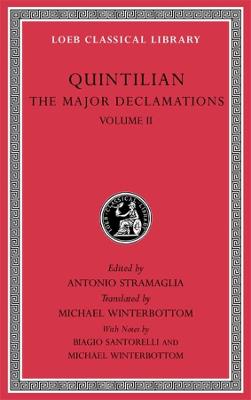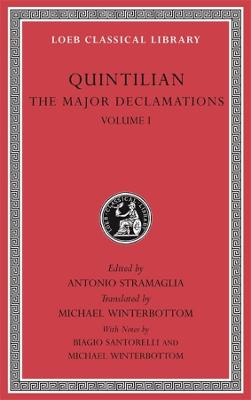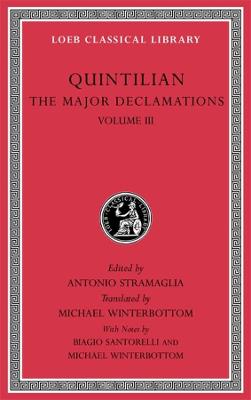Loeb Classical Library
2 primary works • 5 total works
Book 125
Book 500
The Lesser Declamations, dating perhaps from the second century CE and attributed to Quintilian, might more accurately be described as emanating from "the school of Quintilian." The collection--here made available for the first time in translation--represents classroom materials for budding Roman lawyers.
The instructor who composed these specimen speeches for fictitious court cases adds his comments and suggestions concerning presentation and arguing tactics--thereby giving us insight into Roman law and education. A wide range of scenarios is imagined. Some evoke the plots of ancient novels and comedies: pirates, exiles, parents and children in conflict, adulterers, rapists, and wicked stepmothers abound. Other cases deal with such matters as warfare between neighboring cities, smuggling, historical (and quasi-historical) events, tyrants and tyrannicides. Two gems are the speech opposing a proposal to equalize wealth, and the case of a Cynic youth who has forsworn worldly goods but sues his father for cutting off his allowance.
Of the original 388 sample cases in the collection, 145 survive. These are now added to the Loeb Classical Library in a two-volume edition, a fluent translation by D. R. Shackleton Bailey facing an updated Latin text.
The Major Declamations stand out for their unique contribution to our understanding of the final stage in Greco-Roman rhetorical training. These exercises, in which students learned how to compose and deliver speeches on behalf of either the prosecution or the defense at imaginary trials, demonstrate how standard themes, recurring situations and arguments, and technical rules were to be handled by the aspiring orator. And what is more, they lay bare the mistakes that students often made in this process.
The practice of declamation was already flourishing in Greece as early as the fifth century BC, but nearly all of its vast tradition has disappeared except the present anthology, whose nineteen declamations are almost the only substantial examples surviving from pre-medieval Latinity. They seem to represent that tradition reasonably well: although attributed to the great master Quintilian in antiquity, internal features indicate multiple authorship from around AD 100 to the mid- or late third century, when the collection was assembled.
A wide variety of fascinating ethical, social, and legal details animates the fictional world conjured up by these oratorical exercises, and although the themes of declamation can be unrealistic and even absurd (often reminiscent of ancient novel and tragedy), they seem to provide a safe space in which a student could confront a range of complex issues, so as to attain both the technical knowledge necessary to speak persuasively and the soft skills needed to manage the challenges of adult life under the Roman empire.
The Major Declamations stand out for their unique contribution to our understanding of the final stage in Greco-Roman rhetorical training. These exercises, in which students learned how to compose and deliver speeches on behalf of either the prosecution or the defense at imaginary trials, demonstrate how standard themes, recurring situations and arguments, and technical rules were to be handled by the aspiring orator. And what is more, they lay bare the mistakes that students often made in this process.
The practice of declamation was already flourishing in Greece as early as the fifth century BC, but nearly all of its vast tradition has disappeared except the present anthology, whose nineteen declamations are almost the only substantial examples surviving from pre-medieval Latinity. They seem to represent that tradition reasonably well: although attributed to the great master Quintilian in antiquity, internal features indicate multiple authorship from around AD 100 to the mid- or late third century, when the collection was assembled.
A wide variety of fascinating ethical, social, and legal details animates the fictional world conjured up by these oratorical exercises, and although the themes of declamation can be unrealistic and even absurd (often reminiscent of ancient novel and tragedy), they seem to provide a safe space in which a student could confront a range of complex issues, so as to attain both the technical knowledge necessary to speak persuasively and the soft skills needed to manage the challenges of adult life under the Roman empire.
The Major Declamations stand out for their unique contribution to our understanding of the final stage in Greco-Roman rhetorical training. These exercises, in which students learned how to compose and deliver speeches on behalf of either the prosecution or the defense at imaginary trials, demonstrate how standard themes, recurring situations and arguments, and technical rules were to be handled by the aspiring orator. And what is more, they lay bare the mistakes that students often made in this process.
The practice of declamation was already flourishing in Greece as early as the fifth century BC, but nearly all of its vast tradition has disappeared except the present anthology, whose nineteen declamations are almost the only substantial examples surviving from pre-medieval Latinity. They seem to represent that tradition reasonably well: although attributed to the great master Quintilian in antiquity, internal features indicate multiple authorship from around AD 100 to the mid- or late third century, when the collection was assembled.
A wide variety of fascinating ethical, social, and legal details animates the fictional world conjured up by these oratorical exercises, and although the themes of declamation can be unrealistic and even absurd (often reminiscent of ancient novel and tragedy), they seem to provide a safe space in which a student could confront a range of complex issues, so as to attain both the technical knowledge necessary to speak persuasively and the soft skills needed to manage the challenges of adult life under the Roman empire.
